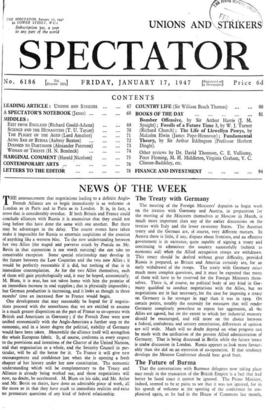The Treaty with Germany
The meeting of the Foreign Ministers' deputies to begin work on the treaties with Germany and Austria, in preparation for the meeting of the Ministers themselves at Moscow in March, is much more important than any of the earlier discussions on the treaties with Italy and the lesser ex-enemy States. The Austrian treaty and the German are, of course, very different matters. In Austria there is little, if any, dispute about frontiers, and an effective government is in existence, quite capable of signing a treaty and continuing to administer the country successfully (subject to economic aid) wiles the Allied occupation troops are withdrawn. This treaty should be drafted without great difficulty, provided Russia is prepared, as Britain and America certainly are, for an early withdrawal of the troops. The treaty with Germany raises much more complex questions, and it must be expected that many of them will have to be reserved for the Foreign Ministers them- selves. There is, of course, no political body of any kind in Ger- many qualified to conduct negotiations with the Allies, but no negotiations are in fact necessary, for the case for imposing a treaty on Germany is far stronger in 1947 than it was in 1919. On certain points, notably the necessity for measures that will render Germany completely powerless to repeat her aggression, all the Allies are agreed, but on the extent to which her industrial recovery should be encouraged, and still more on the choice between a federal, confederate and unitary constitution, differences of opinion are still wide. Much will no doubt depend on what progress can be made with the unification of the present Allied administration of Germany. That is being discussed in Berlin while the future treaty is under discussion in London. Russia appears to look more favour- ably than she did on an extension of co-operation. If that tendency develops the Moscow Conference should bear good fruit.


































